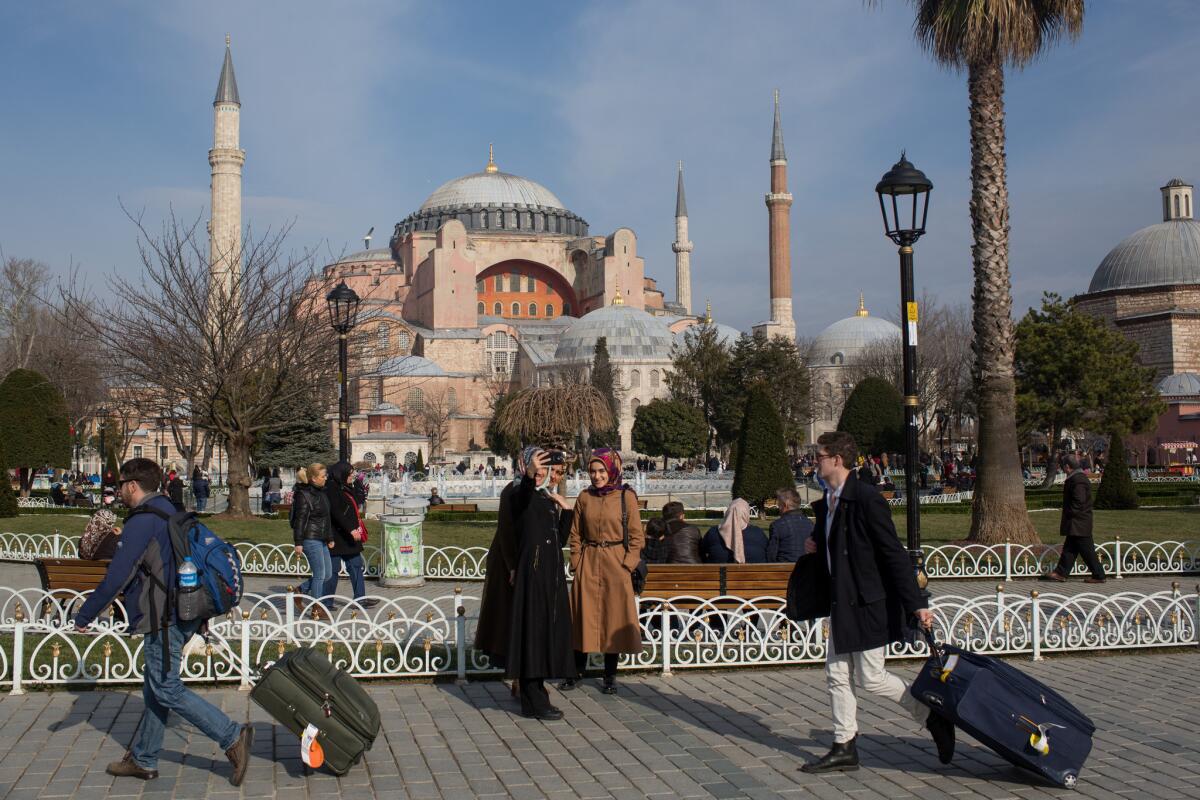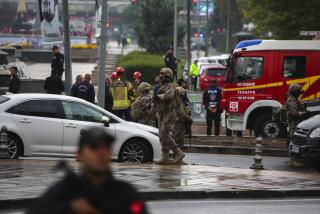Turkey, travel and terrorists: Five things to know

Tourists walk past the Hagia Sofia in Istanbul’s famous Sultanahmet District on Feb. 1.
Turkey, a growing travel destination in recent years, has been a repeat terrorist target in recent months. Before you book that Turkish trip – or cancel it -- consider these five points.
The U.S. State Department is increasingly nervous. On Feb. 4, the agency warned Americans against travel to southeastern Turkey because of “an increased threat of terrorist attacks,” perhaps from an international terror organization, perhaps from an indigenous one.
But not all the trouble is confined to the southeastern area near the Syrian border. On Jan. 12 in Istanbul, a killer in his 20s with Islamic State ties detonated a bomb-rigged vest, killing 10 German tourists and himself at one of the city’s busiest tourist spots, the Sultanahmet District. That area, which includes the Blue Mosque and the Hagia Sophia, is basically ground zero for travelers in a city famed for its position straddling Europe and Asia.
Turkish officials have said that the bomber had entered the country as a Syrian refugee. His attack followed multiple terrorist killings last year, including an Oct. 10 bombing in Ankara that killed more than 100. On Jan. 14, just two days after the Istanbul bombing, came a car-bomb-and-gunfire attack on a police headquarters in Turkey’s southeastern Diyarbakir Province, killing another five people or more. Government officials blamed that attack on Kurdish separatist terrorists, whose history of clashes with Turkish government troops is long and bloody.
Despite a slowdown at the end of the year, American travel to Turkey was up in 2015.
Turkish government figures show 798,787 Americans visited the country in 2015, up 1.8% from the year before.
And those Americans had plenty of company. Turkey’s Roman, Byzantine and Ottoman history, its beaches, landmarks and architecture drew 36.2 million tourists in 2015, which puts it among the world’s six most popular destination countries. Its international tourist traffic has doubled over the last decade.
Though Turkey is 99% Muslim, its government is a secular democracy and Istanbul (population 14 million) is as worldly as a city can be. In summer months, the waterfront hosts dozens of international cruise ships (although some cruise lines have shied away since August). Budget travelers often assemble itineraries with Istanbul stops because Turkish Airlines typically has some of the lowest prices on transatlantic routes.
That said, traffic began slipping in July, and December’s international arrivals were down 7.29% from the year before, Turkish statistics show.
The Russians are backing away. Over the last four years, Turkish beaches became a leading vacation spot for Russians, who were allowed to enter Turkey without needing visas. For most of 2015, Russian visitors far outnumbered Americans. In fact, only German sent more tourists to Turkey. But after the Nov. 24 downing of a Russian military plane by Turkish forces near the Turkey-Syria border, Russia started warning its travelers to avoid Turkey. The Russian news agency Sputnik has speculated that more Russians will head to Cuba, China and Vietnam as a result of the change.
Turkey now has enough Syrian refugees to fully populate the cities of San Francisco and San Diego. War-ravaged Syria is Turkey’s southern neighbor. And though Turkey has tried to rebuff new refugees, that border isn’t especially secure. The United Nations Refugee Agency estimated on Dec. 31 that 2.5 million Syrian refugees had entered Turkey, taxing the country’s infrastructure.
It’s more than 500 miles from Istanbul to the Syrian border. To the devastated Syrian city of Aleppo, it’s about 750 driving miles. Istanbul, the hub of Turkey’s tourism, is at the northwestern end of the country. The nearest borders are Greece and Bulgaria. The Turkish tourist destinations Bodrum and Ephesus are on the country’s west coast and Cappadocia is central, still more than 300 miles from the Syrian border. Most American tourists never get to southeastern Turkey, where the border is.
christopher.reynolds@latimes.com
ALSO:
National park visits are climbing -- especially (wait for it) at Joshua Tree
Celebrating our national parks
The latest buzz on flying drones in state and national parks: Rules can still be vague
California’s national parks: A photographic history seen through The Times’ archives
More to Read
Sign up for The Wild
We’ll help you find the best places to hike, bike and run, as well as the perfect silent spots for meditation and yoga.
You may occasionally receive promotional content from the Los Angeles Times.






